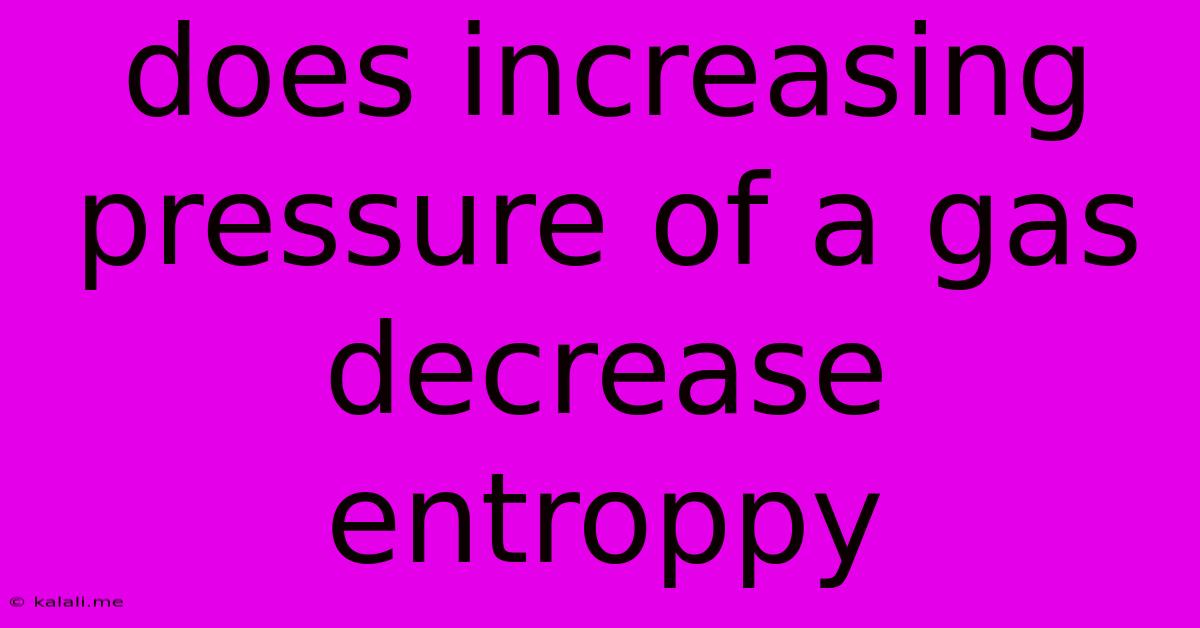Does Increasing Pressure Of A Gas Decrease Entroppy
Kalali
Jun 08, 2025 · 3 min read

Table of Contents
Does Increasing the Pressure of a Gas Decrease Entropy?
The relationship between pressure and entropy in a gas is a fundamental concept in thermodynamics. The short answer is: yes, increasing the pressure of a gas generally decreases its entropy. This article will explore why this is the case, delving into the microscopic and macroscopic perspectives, and examining exceptions to this rule. Understanding this relationship is crucial for various applications in chemistry, physics, and engineering.
Understanding Entropy
Before diving into the pressure-entropy relationship, let's briefly review entropy itself. Entropy (S) is a thermodynamic property that measures the degree of randomness or disorder within a system. A higher entropy value indicates a greater degree of disorder, while a lower value suggests a more ordered state. On a microscopic level, entropy reflects the number of possible microstates (arrangements of particles) corresponding to a given macrostate (observable properties like temperature and pressure).
The Effect of Pressure on Gas Entropy
When you increase the pressure of a gas, you are essentially forcing its molecules closer together. This reduces the volume available for the gas molecules to move around in. Consequently, the number of possible microstates decreases, leading to a reduction in entropy. The gas molecules become more confined and less disordered. Imagine a perfectly ordered line of marbles (low entropy) versus those same marbles scattered randomly across a table (high entropy). Increasing the pressure is analogous to confining the marbles to a smaller area, decreasing their randomness, and thus, their entropy.
Isothermal Compression: A Key Example
Consider an isothermal compression process. This means the temperature remains constant throughout the compression. Even though the temperature doesn't change, the decrease in volume directly results in a decrease in entropy. The molecules have less space to occupy and fewer ways to arrange themselves, even though their average kinetic energy (and thus temperature) is unchanged. This is a classic example illustrating the link between pressure, volume, and entropy.
Exceptions and Considerations
While the general rule holds true, it’s important to acknowledge some exceptions and nuances:
- Non-ideal gases: The relationship between pressure and entropy becomes more complex when dealing with non-ideal gases, where intermolecular forces play a significant role. These forces can affect the arrangement of molecules and, consequently, the entropy.
- Phase transitions: If increasing the pressure leads to a phase transition (like gas to liquid), the entropy change will be more complicated and might not follow the simple direct relationship. Condensation, for example, involves a significant decrease in entropy.
- Adiabatic processes: In adiabatic processes (no heat exchange), the relationship between pressure and entropy becomes intertwined with temperature changes. While pressure increases, the temperature might also increase, leading to a more complex entropy calculation.
Practical Applications
Understanding the pressure-entropy relationship has numerous practical implications, including:
- Refrigeration and air conditioning: These systems rely on the compression and expansion of refrigerants, which involve significant entropy changes.
- Chemical reactions: Pressure influences the equilibrium position of many chemical reactions, and understanding the entropy changes involved is crucial for predicting reaction outcomes.
- Power generation: Thermodynamic cycles in power plants (like the Rankine cycle) involve changes in pressure and entropy, affecting efficiency.
In conclusion, increasing the pressure of a gas generally leads to a decrease in entropy because it reduces the volume available for molecular motion, thus restricting the number of possible microstates. While exceptions exist, particularly with non-ideal gases and phase transitions, the fundamental relationship remains consistent: higher pressure typically implies lower entropy for a gas.
Latest Posts
Latest Posts
-
How To Get Pen Ink Off Skin
Jun 08, 2025
-
Can You Walk Over Covered In Ground Swimming Ools
Jun 08, 2025
-
Witcher 3 Console Commands Skip Quest
Jun 08, 2025
-
How Long To Let Bread Cool Before Cutting
Jun 08, 2025
-
What Does A 220 Plug Look Like
Jun 08, 2025
Related Post
Thank you for visiting our website which covers about Does Increasing Pressure Of A Gas Decrease Entroppy . We hope the information provided has been useful to you. Feel free to contact us if you have any questions or need further assistance. See you next time and don't miss to bookmark.